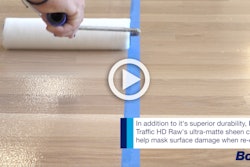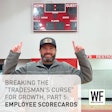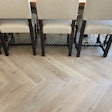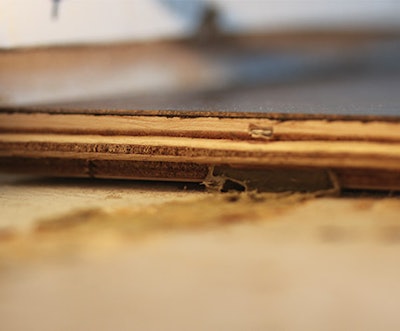
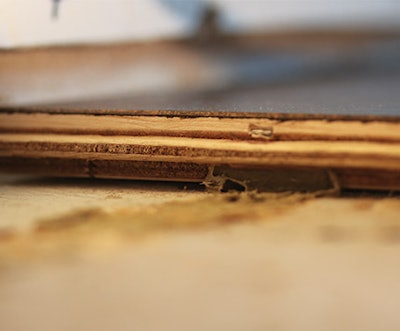
The Homeowner's Issue
The consumer complained to the retailer that his engineered wood flooring needed to be replaced due to noise. The retailer and a rep from the installation company visited the home to inspect the floor, and when walked on, the floor made snap, crackle and pop noises. The retailer observed movement in the planks, told the homeowner the noise was due to a "manufacturer defect" and said he would get the customer a new floor. The manufacturer contacted an inspector.
Roy: The Inspector's Observations
I discovered the installation company subcontracted the install to one of its preferred installers. During my inspection, I saw that the subcontractor used beads of adhesive to assist his nail-down installation of 5-inch-wide prefinished flooring, per the manufacturer's recommendation, but instead of being in a serpentine pattern down the length of each plank (as recommended), he applied beads of adhesive perpendicular to the flooring every 12 inches. Additionally, he used 1-inch fasteners rather than the required 1¼-inch fasteners. I noticed that the adhesive was not compressed by the flooring, and as a result there were 0.045-inch gaps between the bottom of the flooring and the subfloor in the areas where the adhesive was not applied. The gaps between the subfloor and the wood floor planks allowed the flooring to move vertically, causing the snap, crackle and pop noises.
Blake: The Attorney's Analysis
Does the retailer's statement to the customer that it would get the customer a new floor mean that the retailer is liable for that promise? As a practical matter, the answer is "no." A statement after the job is done, such as, "I'll take care of this," is not legally binding unless it was made as part of a new signed agreement or an addendum to the original agreement with the retailer. Since the noises are the result of incorrect adhesive application, the installation company is responsible for fixing (or, more likely, replacing) the floor. Let's hope the installation company has a good written agreement with the subcontractor and can force the subcontractor to replace the floor. Unless it was disclaimed in a written agreement, the installation company (and therefore the subcontractor) must also pay for new flooring. The final question is: To whom is the installation company liable? If the owner did the hiring, the installation company is directly liable to the owner. But if the retailer did the hiring, the installation company is liable to the retailer, who is liable to the owner.
RELATED: Familiarize Yourself with Wood Floor Adhesive Basics



















